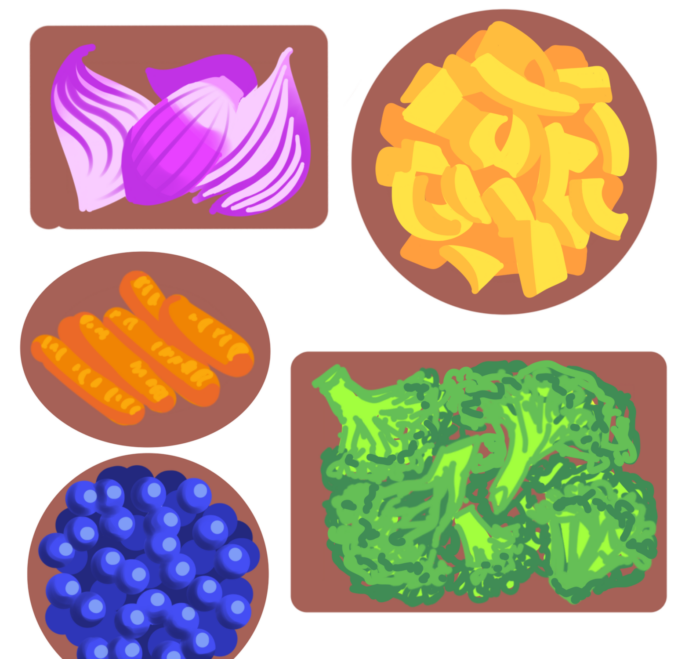UC Davis students provide insight on how cooking and eating rituals play a role in their day-to-day lives
By JENEVAH HARRISON — features@theaggie.org
College life often evokes images of late-night study sessions fueled by instant ramen or greasy pizza deliveries. However, at UC Davis, students hope to redefine the stereotype by introducing creative approaches to healthy eating, even amidst packed schedules. However, this is easier said than done to implement. From meal prep hacks to mindful grocery shopping, these Davis students shared that though it can be difficult, maintaining a nutritious diet is achievable — and there are plenty of resources to help.
Many students without a meal plan on campus initially struggle with maintaining balanced cooking routines and find themselves uncertain or stressed about the responsibility that comes with practicing a regular cooking schedule.
“I usually eat out most days of the week and cook maybe once or twice a week,” Madeline Hass, a second-year environmental science and management major, said. “But it’s definitely a New Year’s resolution of mine to start cooking it up more.”
Between lectures, labs and the ever-looming threat of deadlines, it’s easy for nutrition to take a backseat. For many students, convenience and cost dictate their eating habits.
“When you’re on a tight budget and limited time, fast food often feels like the quickest option,” Hazel Henninger, a second-year history major, said. “I realized eating poorly was really affecting my energy levels; I often felt sluggish and just straight up gross, which definitely didn’t help with my workload.”
For Henninger, the realization that eating well wasn’t just about maintaining a visually healthy appearance but also a healthy mind, ultimately motivated her to make some changes.
UC Davis students have found that small, consistent habits can make a big impact. For example, one strategy to avoid cooking every day is developing a meal-prep routine. This may include preparing food items in bulk to last the whole week.
“The Nutrition Source” from Harvard University’s School of Public Health provides a meal prep guide which may be helpful for some students. They express the substantial benefits of meal planning and prepping which has the potential to help with time and money management, weight control and creating a balanced, nutritious diet while reducing stress levels, according to the meal prep guide.
For those less keen on extensive meal prep, batch cooking is another less extensive approach. This strategy consists of cooking a large batch of one meal that will last for several days, allowing less time devoted to preparing meals multiple times a week.
Smart shopping goes hand-in-hand with developing healthy eating habits. The Davis Farmers Market is a popular location to obtain quality, locally produced fruits and vegetables. Many students enjoy the convenience of the market and its surplus of fresh produce, as well as the overall pleasant atmosphere.
“I love going to the farmers market,” Maria Gonzales, a second-year nutrition science major, said. “It’s not only about getting fresh fruits and veggies — it’s also a way to de-stress and enjoy the community.”
For others, planning grocery trips with lists helps avoid impulse buys and ensures they stick to their budget. Focusing on buying simple, staple food items that balance each other is especially important when planning these trips.
Sometimes, even the best plans can go awry when midterms and finals season hits. To stay on track during hectic times, students rely on quick and easy recipes that require minimal effort.
While some like Hass rely on eating out during these hectic periods — which is completely reasonable — quick recipes to snack on may also be ideal. Some common examples include overnight oats, tortilla wraps and fruit with peanut butter — but there are plenty of other healthy snack options to discover online or through friends.
For students looking to begin their own healthy eating journey, it’s best to start with small steps. Changing your entire diet overnight is not realistic, but performing small gradual changes is ideal in moving toward new goals.
Written by: Jenevah Harrison — features@theaggie.org





